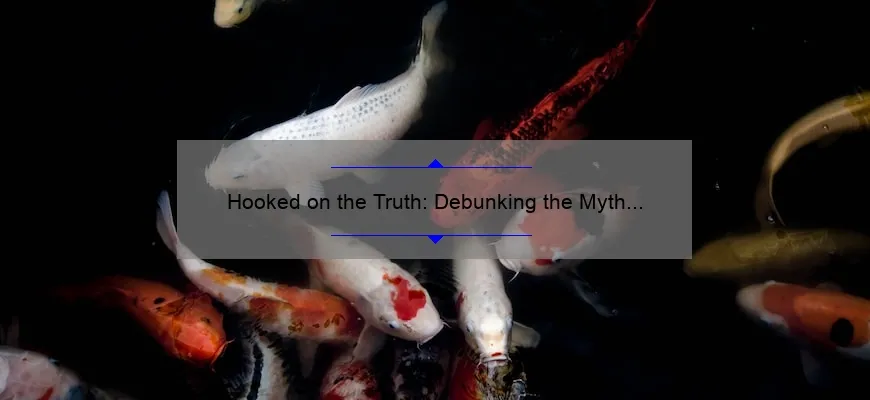Short Answer: Does a fish feel pain when hooked?
Studies have shown that fish are equipped with nociceptors, which means they have the capability to sense pain. Fishing practices such as catch and release can cause physical harm and stress, leading to pain and even death for the fish.
Understand the Experience: How Does a Fish Process Pain When Hooked?
Fishing is one of the most popular recreational activities in the world, enjoyed by millions of people every year. But as with any activity that involves interacting with animals, it’s important to consider how our actions affect them. One question that often comes up when discussing fishing ethics is whether fish are capable of feeling pain when they’re hooked.
In short: yes, they are. Recent studies have shown that fish have complex nervous systems and can experience a wide variety of sensations including pain. This means that catching and reeling in a fish can be a traumatic experience for the animal.
But understanding how a fish processes pain requires digging into some fascinating biology. A fish’s sensory organs – its eyes, nose, mouth, skin and lateral line – are constantly taking in information about its environment. When something changes (like a hook piercing its lip), those sensors send signals through the nervous system to the brain.
Fish brains aren’t identical to human brains, but they do share many similarities in terms of structure and function. Just like us, fish have areas of their brains devoted to processing different types of sensory input – including nociception or “pain sensation”. Some species even release chemicals similar to human endorphins which block these painful receptors during times stress such as being caught on fishing lines.
One thing that sets fishes apart from humans is how quickly they respond to stimuli; research has shown that it takes just 0.5 seconds for a signal from one part of a fishtechnically known as reflexes- could cause their tail flick significantly without attracting predators.. This rapid response time may actually help them avoid danger in some cases (say if there’s an approaching predator)but drowned faster once caught on hooks or netted .
So while we still don’t fully understand what exactly “hurts”a fish physiologically after getting hooked ,it’s clear enough evidence suggests these aquatic creatures feel discomfort at best,fear,stress and could possibly be in alarming pain during the whole process of being caught – to a degree probably impossible for us humans to imagine.
Ultimately, it’s important to respect all living creatures that we interact with, whether they’re furry or scaly. As fishermen and fisherwomen, we should strive not only to minimize the harm we do but also perhaps go towards more “compassionate” non-harming fishing practices like catch-and-release methods (with barbless hooks) where there is minimal damage done.Today,the technology available allows us kindly release nearly every type of species needed without making them suffer too much or dying instantly ,if maintained properly. By doing so ,we can continue enjoying our beloved sport while protecting our environment for future generations’ enjoyment as well.!
Taking it Apart: A Step-by-Step Look at Whether Fish Can Feel Pain When Hooked
Fishing is a popular leisure activity that attracts people from all walks of life. From veteran anglers to enthusiastic beginners, there’s no denying the thrill of casting your line out and feeling that first tug on the hook. But have you ever stopped to consider whether fish can feel pain when hooked? It’s an age-old debate that has been raging for years, with passionate arguments from both sides.
On one hand, some experts claim that fish are incapable of experiencing pain in the way we do. As cold-blooded creatures with vastly different nervous systems than mammals, they simply lack the capacity to suffer as we would understand it. The argument goes that although fish may exhibit behaviors commonly associated with distress – such as thrashing around or trying to escape – these responses are purely reflexive and not indicative of actual physical or emotional discomfort.
However, other scientists and animal welfare advocates argue that this view is oversimplified at best and downright dangerous at worst. They point to numerous studies demonstrating how fish possess complex nerve networks capable of sensing various forms of stimuli including heat, pressure, touch – and yes, even pain. Further research shows events like being caught up by hooks causes physiological changes in fishes’ bodies suggesting underlining level of stress which can be linked realistically with their subjective experiences similar agonizing emotions humans go through during painful contrivances.
To make things more complicated yet fascinating; researchers indicate not all fishes respond similarly towards harmful conditions induced upon them rather certain species demonstrate higher levels while others surprisingly portrays insensitivity against same degree of stressful situations left respondents scratching head over these non-standardized results.
So what does this mean for those who enjoy fishing? While it’s impossible to come up with a definitive answer right now- In general if individuals act cautiously keeping in mind ethical catch-and-release practices where ultimately targeted Fish returns back unharmed into its habitat after posing serious entertainment factor , Kudos! Then carried out guided steps on handling methods depending on the specimen. which includes minimizing any unnecessary injury and harm as well as being gentle with their process can ensure safety for both parties while we wait to unravel the complex mysteries of pain perception in fish.
In conclusion, there is still much to learn about whether or not fish feel pain when hooked – Until then- Adhering strict to guides , precautions & coming up consciously if leave your back door open doesn’t going to solve world crisis overnight but it indeed takes care of own backyard ;Similarly practicing informed & ethical angling procedures not only creating a positive experience overall but also provides certain level welfare ensuring fishes are given equal regards respecting living life form deserving protection measures too.
The Top 5 Facts You Need to Know About Whether or Not a Fish Feels Pain When Hooked
Fishing is a beloved pastime enjoyed by millions of people around the world. However, as with any activity that involves animals, there has been an ongoing debate about whether or not fish feel pain when they are hooked.
Here are the top 5 facts you need to know about this controversial topic:
1. Fish do have nervous systems – The first and perhaps most important fact is that fish do have nervous systems which means they can detect physical stimuli like pressure, heat and light. This may be indicative of their ability to sense pain but it’s still unclear whether or not they experience discomfort in the same way mammals.
2. Fish lack specific brain structures associated with pain perception – While fish undoubtedly have sensory neurons similar to ours for detecting touch, temperature variations or mechanical pressure among other things – their brains lack some of the key structures involved in human/pain experience including those related to higher order processing , attention, memory and cognition .
3. Stress response can lead researchers astray – Unfortunately studies conducted on stress hormones released during fishing indicate increased levels suggesting discomfort/pain causing alarm amongst conservationists but hardly correlating concrete evidence on degree , length or intensity of “agonizing” feelings per se since these hormones could also signify other circumstances than purely feeling painful sensations i.e heightened heart rate being general indicators rather than something specifically tied into agony caused by hooking.
4. Ethics remain contentious issue – The ethics surrounding sportfishing essentially pits individual enjoyment versus animal welfare issues . Some believe fishing causes unnecessary harm whereas others argue catch-and-release methods allow anglers an opportunity to enjoy catching freshwater favourites without seriously impacting natural populations.A number of authorities regulate fishing practices to protect aquatic life through regulations imposed defining appropriate handle measures (catch & release guidelines) while encouraging humane practice towards fish species overall; making sure unescapable situations call out for quick releases under prompt management- weighing options prioritising creature comfort becomes the most reasonable course taking long-term outlooks as well.
5. Scientific research remains inconclusive – Problematically, studies conducted on this topic often involve small sample sizes and may not be formally sanctioned causing interference with overall accuracy yet remain valuable insights even if anecdotal . In short, the question of whether or not fish experience pain when hooked still lacks definitive answers requiring further scientific study to clarify possibilities in a more comprehensive manner.
In conclusion, while it is difficult to determine conclusively whether or not fish feel pain when they are hooked, there is no doubt that ethical considerations need to stay central during fishing activity by ensuring any harm done does not outweigh angling sport’s benefits.A balance between species conservation efforts informed through thorough validated data & preservation ethics should be upheld as equally important issues within the realm of sportfishing culture.

